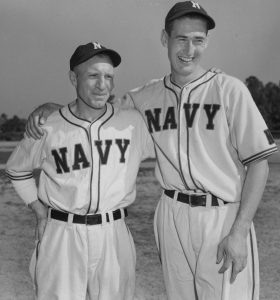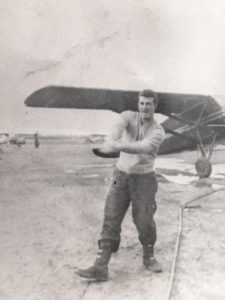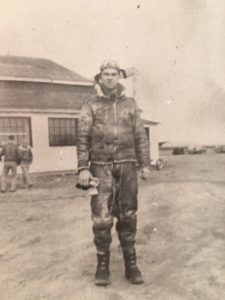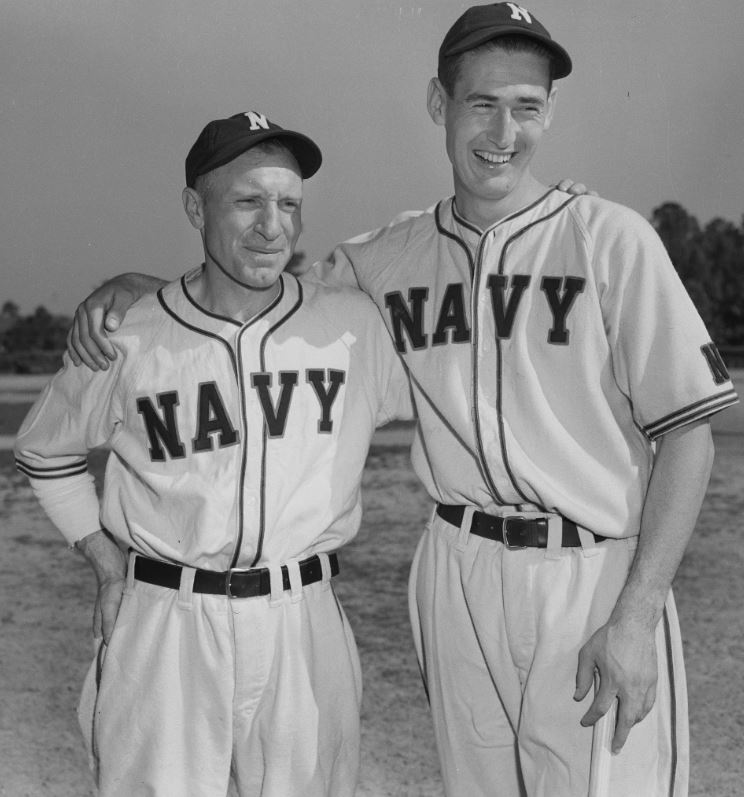
Navy Coach Don Kepler with aviation cadet Ted Williams, 1943. Courtesy US Navy Pre-Flight School, North Carolina Collection, Wilson Library, UNC-Chapel Hill.
When “106 Win” lit up the Green Monster scoreboard this week, breaking the franchise record, Boston Red Sox fans set their sights on a World Series championship. It was 1946, the last time the Red Sox achieved their 100th milestone victory, when they headed to the World Series. Ted Williams, Johnny Pesky, Bobby Doerr, Dom DiMaggio, and Boo Ferriss had returned from the service. They were changed men—bound by their fierce allegiance to country and friendships that lasted a lifetime.
Though the St. Louis Cardinals clinched the World Series that year with a 4-3 victory in game seven, Johnny Pesky did something extraordinary for Ted Williams that slipped under the radar of the press. Until now, this story has largely remained untold, and it serves as an example of the unshakable bond that cements winning teams.
Pesky’s Secret Telephone Call Before Game Five
Midway through the 1946 Series, Pesky made a secret telephone call to an old Navy buddy to lift Williams’s spirits when he was discouraged and hurting from a badly swollen elbow after being smacked by an errant pitch.
That friend was not a major-league player, nor a man who circulated in the most powerful baseball circles. His name was George Donald Kepler, the former Lt. Commander who taught fighter pilots how to survive on land and sea after bailouts and crash landings over jungles and oceans. Kepler also coached Williams and Pesky when they played service-league baseball for a Navy Pre-Flight team in the summer of 1943.
When the call came in, Kepler was living on a farm in the outskirts of State College near Penn State, where he taught outdoor survival, hunter safety, and served as an assistant baseball coach for the Nittany Lions. Kepler was known around Centre County as a big- game hunter, earning the triple crown title for shooting a turkey, deer and a very large bear every year.
One of Kepler’s best friends around campus was George Harvey, the “Dean of American Fly Fishing,” who wrote about angling, and ignited a national passion for fly fishing. Three years earlier, when Williams was an aviation cadet, Kepler bonded with his trainee over a passion that gave them a sense of peace—fishing.
Reporters scrambling to dig up dirt on Williams never caught wind of that meeting when Kepler slipped into the Fenway clubhouse, seemingly, from out of the blue. Pesky left tickets and a pass to the locker room at Will Call, specifically asking Kepler to talk about fishing to calm his friend’s nerves.
For about 30 minutes the officer and his former cadet carried on about fly casting in the cool Pennsylvania rivers snaking around Kepler’s farm. After the exchange, the Navy coach disappeared into the stands at Fenway, where he watched the rest of the game.
According to Kepler’s son, Williams never knew Pesky made that phone call.

Johnny Pesky at Turners Falls airport in early aviation training, 1942. Courtsey Pesky Family.
In rare form, The Kid burst into tears after the Series loss, and he never forgot Kepler’s act of kindness during one of his most vulnerable moments.
Years later, Williams hoped to cast a line for wild trout with his former Navy coach. Though he never got the chance to visit the farm near Happy Valley, they stayed in touch with letters until Kepler’s passing in 1988.

John Sain at Turners Falls, who also trained with Pesky and Williams at Pre-Flight.
On October 5th the Red Sox will open the Division Series on their home turf at Fenway Park against the winner of the American League Wild Card game between the New York Yankees, and most likely, the Oakland Athletics. Based on the Red Sox hard-earned winning streak, the dynamics of talent and trust are definitely in sync. With the steady guidance of manager Alex Cora and the support of the fans, in the words of a Navy pilot, one might say the “sky’s the limit” for a Red Sox victory.
Anne R. Keene is the author of The Cloudbuster Nine, The Untold Story of Ted Williams and the Baseball Team That Helped Win WWII. Dozens of major-league baseball players trained and coached at these special Pre-Flight Naval Aviation Training Schools along with George H. W. Bush, Gerald Ford, John Glenn and “Bear” Bryant and other members of the Greatest Generation. Today, less than 45 major-league World War II veterans remain with us, representing a generation of players who paused their baseball careers to serve their country.
